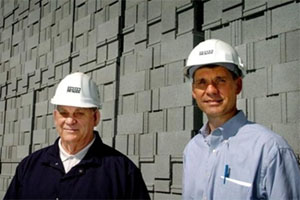September 26, 2009 9:00 AM CDT

Shock loads can hit like a ton of bricks. In the case of Fayblock Company, Fayetteville, N.C., shock loads are a ton of bricks or, more precisely, 12 tons of “green” concrete blocks. Day after day, Fayblock’s automated block production system pours thousands of concrete blocks onto pallet-based forms before loading the pallets, one by one, onto large, wheeled kiln racks. Once loaded, each rack—holding 81 pallets, or about 12 tons of blocks—enters a production kiln, where it slowly proceeds down a track through a 12-hour steaming, drying, and curing process.
While this process imparts remarkable strength and toughness to the block, it once meant continuous torture for the roller bearings installed in each of company’s 57 four-wheeled racks. The pounding, as each of 81 pallets of green block were loaded, followed by hours of heat and steam, took a heavy toll, explains Richard Asbell, who served as the plant’s maintenance manager before his promotion to plant manager in 2001.
“Downtime was a headache—a big-time headache—because we would lose production,” says Richard. “The roller bearings came installed on the racks from the factory. Although we lubed them regularly, they deteriorated, because the load was just too great. Out of 57 racks—that’s 228 wheels in all— there were always some that weren’t working. The bearings would begin to deteriorate. Then, the wheels would start skidding and the racks would become difficult to move.”
The only thing more difficult than moving a stubborn, 12-ton load was trying to replace the failed bearings while the rack remained “in line,” Richard recalls. Each of these unscheduled repairs either halted production in one of the kilns—where up to 9 racks were being treated simultaneously—or blocked the main line from the block-making equipment, bringing the whole plant to a halt. Richard, with company president Bob Allen, contacted their industrial bearings distributor to see what they should do.
“At that point, we learned about the MAXAM Bearing and got in contact with McNeil Industries. The MAXAM Bearing was recommended because it had a record of success in handling shock loads in hot and dusty environments, including steel and brick making, aggregates, and more.”
After a demonstration, Richard and Robert installed four of the bearings as a test. Since that initial test, Fayblock has purchased hundreds of MAXAM Bearings, modified with a snap ring. “Many of the original 228 bearings we got in 1999 are still in service,” says Richard. Other than lubing with a high-temperature grease once every quarter, the bearings have been maintenance-free and trouble-free ever since, despite the shock, dirt, heat, and moisture that conspired to ruin the old roller bearings. The savings—through increased production and reduced maintenance— have been significant. All wheel maintenance is now scheduled, says Richard, who is now managing a wheel-replacement program. “When we order a new set of wheels, we make sure that a MAXAM Bearing is part of the assembly.”
McNeil Industries' MAXAM Bearings Hold Strong
By Masonry

Plant manager Richard Asbell, left, is joined by Robert Allen, President of Fayblock Co.
While this process imparts remarkable strength and toughness to the block, it once meant continuous torture for the roller bearings installed in each of company’s 57 four-wheeled racks. The pounding, as each of 81 pallets of green block were loaded, followed by hours of heat and steam, took a heavy toll, explains Richard Asbell, who served as the plant’s maintenance manager before his promotion to plant manager in 2001.
“Downtime was a headache—a big-time headache—because we would lose production,” says Richard. “The roller bearings came installed on the racks from the factory. Although we lubed them regularly, they deteriorated, because the load was just too great. Out of 57 racks—that’s 228 wheels in all— there were always some that weren’t working. The bearings would begin to deteriorate. Then, the wheels would start skidding and the racks would become difficult to move.”
The only thing more difficult than moving a stubborn, 12-ton load was trying to replace the failed bearings while the rack remained “in line,” Richard recalls. Each of these unscheduled repairs either halted production in one of the kilns—where up to 9 racks were being treated simultaneously—or blocked the main line from the block-making equipment, bringing the whole plant to a halt. Richard, with company president Bob Allen, contacted their industrial bearings distributor to see what they should do.
“At that point, we learned about the MAXAM Bearing and got in contact with McNeil Industries. The MAXAM Bearing was recommended because it had a record of success in handling shock loads in hot and dusty environments, including steel and brick making, aggregates, and more.”
After a demonstration, Richard and Robert installed four of the bearings as a test. Since that initial test, Fayblock has purchased hundreds of MAXAM Bearings, modified with a snap ring. “Many of the original 228 bearings we got in 1999 are still in service,” says Richard. Other than lubing with a high-temperature grease once every quarter, the bearings have been maintenance-free and trouble-free ever since, despite the shock, dirt, heat, and moisture that conspired to ruin the old roller bearings. The savings—through increased production and reduced maintenance— have been significant. All wheel maintenance is now scheduled, says Richard, who is now managing a wheel-replacement program. “When we order a new set of wheels, we make sure that a MAXAM Bearing is part of the assembly.”
About the Author
Masonry, the official publication of the Mason Contractors Association of America, covers every aspect of the mason contractor profession - equipment and techniques, building codes and standards, business planning, promoting your business, legal issues and more. Read or subscribe to Masonry magazine at www.masonrymagazine.com.


















